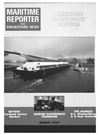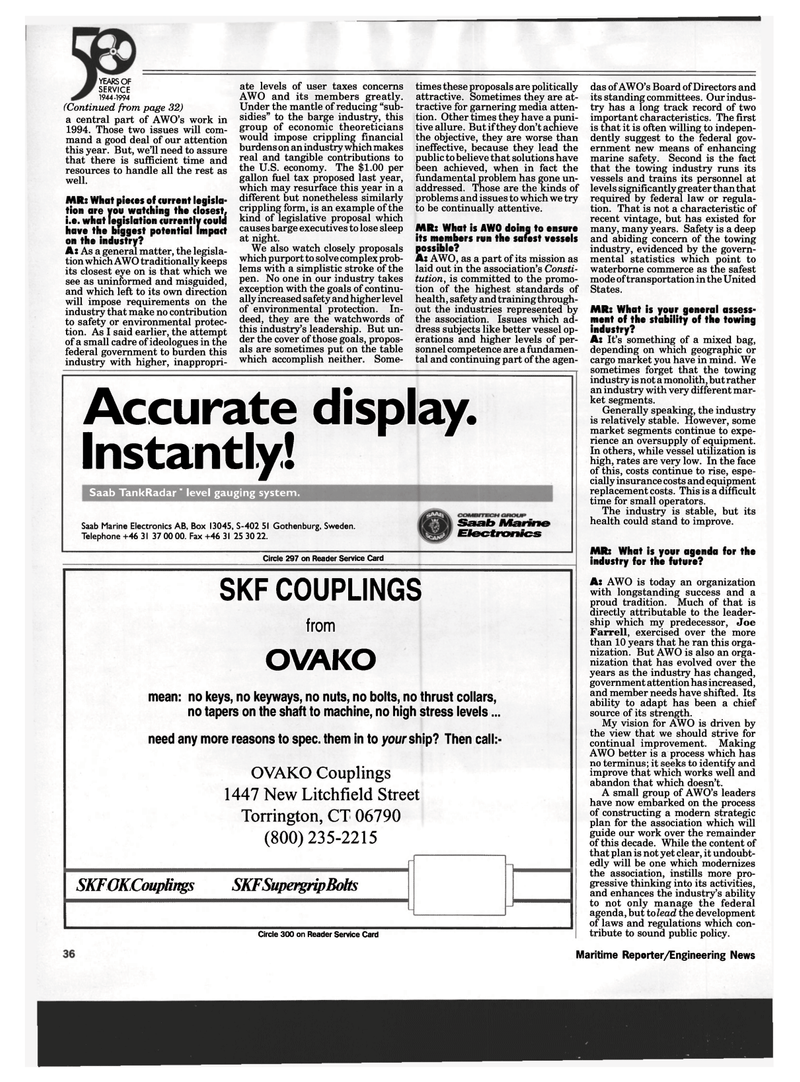
Page 34: of Maritime Reporter Magazine (March 1994)
Read this page in Pdf, Flash or Html5 edition of March 1994 Maritime Reporter Magazine
YEARS OF
SERVICE 1944-1994 (Continued from page 32) a central part of AWO's work in 1994. Those two issues will com- mand a good deal of our attention this year. But, we'll need to assure that there is sufficient time and resources to handle all the rest as well.
MR: What pieces of current legisla- tion are you watching the closest, i.e. what legislation currently could have the biggest potential impact on the industry?
A: As a general matter, the legisla- tion which AWO traditionally keeps its closest eye on is that which we see as uninformed and misguided, and which left to its own direction will impose requirements on the industry that make no contribution to safety or environmental protec- tion. As I said earlier, the attempt of a small cadre of ideologues in the federal government to burden this industry with higher, inappropri- ate levels of user taxes concerns
AWO and its members greatly.
Under the mantle of reducing "sub- sidies" to the barge industry, this group of economic theoreticians would impose crippling financial burdens on an industry which makes real and tangible contributions to the U.S. economy. The $1.00 per gallon fuel tax proposed last year, which may resurface this year in a different but nonetheless similarly crippling form, is an example of the kind of legislative proposal which causes barge executives to lose sleep at night.
We also watch closely proposals which purport to solve complex prob- lems with a simplistic stroke of the pen. No one in our industry takes exception with the goals of continu- ally increased safety and higher level of environmental protection. In- deed, they are the watchwords of this industry's leadership. But un- der the cover of those goals, propos- als are sometimes put on the table which accomplish neither. Some- times these proposals are politically attractive. Sometimes they are at- tractive for garnering media atten- tion. Other times they have a puni- tive allure. But if they don't achieve the objective, they are worse than ineffective, because they lead the public to believe that solutions have been achieved, when in fact the fundamental problem has gone un- addressed. Those are the kinds of problems and issues to which we try to be continually attentive.
MR: What is AWO doing to ensure its members run the safest vessels possible?
A: AWO, as a part of its mission as laid out in the association's Consti- tution, is committed to the promo- tion of the highest standards of health, safety and training through- out the industries represented by the association. Issues which ad- dress subjects like better vessel op- erations and higher levels of per- sonnel competence are a fundamen- tal and continuing part of the agen- das of AWO's Board of Directors and its standing committees. Our indus- try has a long track record of two important characteristics. The first is that it is often willing to indepen- dently suggest to the federal gov- ernment new means of enhancing marine safety. Second is the fact that the towing industry runs its vessels and trains its personnel at levels significantly greater than that required by federal law or regula- tion. That is not a characteristic of recent vintage, but has existed for many, many years. Safety is a deep and abiding concern of the towing industry, evidenced by the govern- mental statistics which point to waterborne commerce as the safest mode of transportation in the United
States.
MR: What is your general assess- ment of the stability of the towing industry?
A: It's something of a mixed bag, depending on which geographic or cargo market you have in mind. We sometimes forget that the towing industry is not a monolith, but rather an industry with very different mar- ket segments.
Generally speaking, the industry is relatively stable. However, some market segments continue to expe- rience an oversupply of equipment.
In others, while vessel utilization is high, rates are very low. In the face of this, costs continue to rise, espe- cially insurance costs and equipment replacement costs. This is a difficult time for small operators.
The industry is stable, but its health could stand to improve.
MR: What is your agenda for the industry for the future?
A: AWO is today an organization with longstanding success and a proud tradition. Much of that is directly attributable to the leader- ship which my predecessor, Joe
Farrell, exercised over the more than 10 years that he ran this orga- nization. But AWO is also an orga- nization that has evolved over the years as the industry has changed, government attention has increased, and member needs have shifted. Its ability to adapt has been a chief source of its strength.
My vision for AWO is driven by the view that we should strive for continual improvement. Making
AWO better is a process which has no terminus; it seeks to identify and improve that which works well and abandon that which doesn't.
A small group of AWO's leaders have now embarked on the process of constructing a modern strategic plan for the association which will guide our work over the remainder of this decade. While the content of that plan is not yet clear, it undoubt- edly will be one which modernizes the association, instills more pro- gressive thinking into its activities, and enhances the industry's ability to not only manage the federal agenda, but to lead the development of laws and regulations which con- tribute to sound public policy.
Accurate display.
Instantly!
Saab TankRadar" level gauging system.
Saab Marine Electronics AB, Box 13045, S-402 51 Gothenburg, Sweden.
Telephone +46 31 37 00 00. Fax +46 31 25 30 22.
Saab Marine
Electronics
Circle 297 on Reader Service Card
SKF COUPLINGS from
OVAKO mean: no keys, no keyways, no nuts, no bolts, no thrust collars, no tapers on the shaft to machine, no high stress levels... need any more reasons to spec, them in to your ship? Then call:-
OVAKO Couplings 1447 New Litchfield Street
Torrington, CT 06790 (800) 235-2215
SKF OK Couplings SKFSupergripBolts
Circle 300 on Reader Service Card 100
Maritime Reporter/Engineering News

 33
33

 35
35
